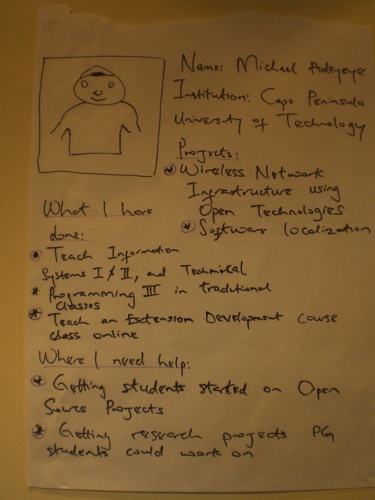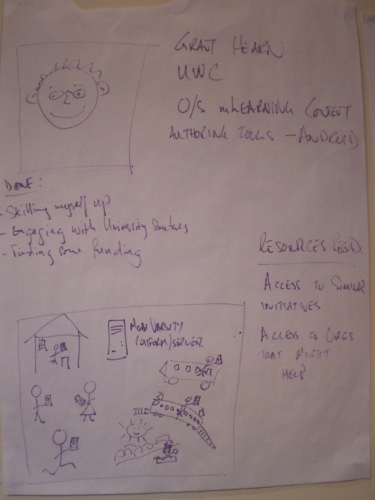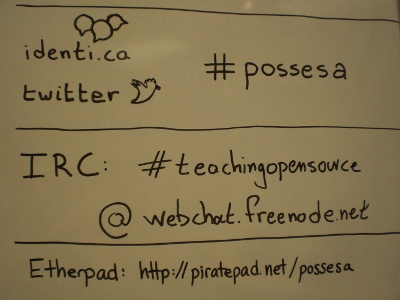POSSE South Africa, day 1
I'm writing from POSSE South Africa - while other attendees are recapping the day and posting their deliverables, I'm prepping readings for tomorrow. We'll be putting everyone's blogs on Planet Teaching Open Source so that the broader TOS community can start getting to know our newcomers and what they're up to. Here are a few of our attendees, their self-portraits, and their project descriptions. First, Michael Adeyeye, the primary driver behind this event and the man who organized all of the logistics to make it happen (thank you, Michael!)
One thing Michael doesn't say in his poster is that he's learning how to become a POSSE instructor, since he'd like to run more of these workshops across Africa. I'm looking forward to supporting these, and am hoping that some of our other participants this week will want to join him - it would be great to see the practice of teaching open source spread across the continent.

Next is Grant, from University of the Western Cape, who's already working on Android development and quickly started asking lots of questions on IRC once we got the class into the #teachingopensource channel - I watched over lunch as he and Jan steadily built on each others' ideas ("5 phones? Ask for 500!") over lunch until they started reaching ridiculous (and exciting) proportions. Awesome.

More faces coming as the week goes by. You can also follow us online (see picture below for Pierros's fantastic handwriting).

The week is about open source development and teaching. Today's theme was "Open" (tomorrow will be "source," then "development," etc.) The big idea for the day: The ability to be "productively lost" in a FOSS project cannot be obtained through sheer increase in technical skill alone; the ability to communicate within a project's culture is a crucial skill. Most of the tool-based information I consider to be important today has already been covered in a Fedora Classroom session on distributed collaboration, which I re-taught today in person. We covered IRC and logging bots, wikis, blogs and planet aggregators, and real-time collaborative text editing with Etherpad.
Much more important were the cultural aspects of FOSS participation. It's hard for experienced contributors to remember just how bewildering it can be - my first thoughts as a newcomer were: (1) aaah! lots of new tools! and (2) aaah! people are talking about a lot of things I don't understand! and (3) ...er, I'm not sure if it's okay for me to ask a question? This is even more scary for professors, who are used to being expected to "know the answer." How do you become comfortable in guiding your students through chaos you don't control and will never fully understand?
Even now, after years working in open source, I don't understand 90% of the stuff I come across, if not more - that's normal. So setting the expectations that it's okay to not understand everything that's going on, that you should speak up, ask questions, we're flexible, etc - that's the hardest part of the first day, and every single attendee handled it with remarkable grace. I love this class.
You can view logs from throughout the day at the meeting minute archive; these aren't written for remote participation since the first day is very heavy on new collaboration tools and cultures and therefore requires a lot of in-person scaffolding. I'm going to be compiling first-day posts into an opensource.com/education article on Day 1, now that everyone's gotten their blogs in.